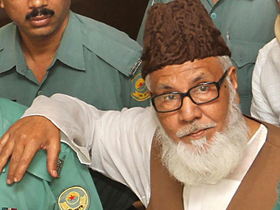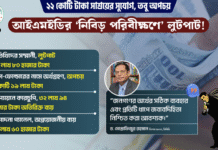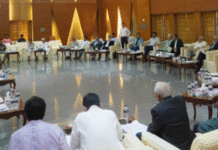The defence counsel for Motiur Rahman Nizami, the supremo of villainous 1971 Al Badr, on Thursday outright rebutted the charge of intellectuals’ killing against his client to make the country intellectually bankrupt at the fag end of the Liberation War, knowing their ignominious defeat.
“The prosecution had failed to produce any single cogent evidence, including the papers and documents, before the International Crimes Tribunal-1 to prove the charge of intellectuals’ killing,” claimed Mizanul Islam during the rehearing defence case summing-up arguments based on charges for the third day.
Despite acknowledging the intellectuals’ killing as admitted fact that had taken place during the 1971 Liberation War against the Pakistan occupation forces, the defence counsel held that the charge of intellectuals’ killing made against his client was not framed as per the International Crimes (Tribunals) Act 1973.
There remains a lack of competence in this regard from the investigation and the prosecution, and because of that failure it does not make the offence of intellectuals’ killing to be sufficiently understood, said Mizanul.
In support of his contention, the defence counsel argued that while framing the charge nothing specifically was mentioned about ‘when, where and how’ the crime had taken place, which is a prerequisite of legal procedure.
Mizanul said no specific allegation of intellectuals’ killing was made against accused Nizami, terming those vague. As a result, the prosecution got its evidence done through producing tutored witnesses before the tribunal.
Refuting the evidence made by prosecution witnesses – Shyamoli Nasrin Chowdhury and Salma Huq, wives of martyred Dr Abdul Alim Chowdhury and Dr Azharul Huq respectively, the defence counsel came down heavily on them and told the tribunal that both the PWs had concealed the truth and information. Both the PWs did not demonstrate their honesty, he alleged.
According to the prosecution, at the behest of their boss Nizami, a group of Al Badr picked up noted eye specialist Dr Alim and surgeon Dr Azhar blind- folded from their respective houses and later their disfigured bodies were found floating on the canal near Notre Dame College and Rayerbazar mass grave respectively.
Although the defence counsel admitted the prosecution statement introducing Nizami as president of Islami Chhatra Sangha (ICS), a student wing of Jamaat-e-Islami, during the Liberation War, but he refused to admit that Nizami had emerged as commander-in-chief of Al Badr, an auxiliary force of the Pakistan occupation army.
Underpinning his claim, Mizanul said the prosecution had failed to provide any genuine document in this regard. Even the reports published in the newspapers during the Liberation War over Nizami, he was nowhere identified as the Al Badr chief.
About the charge of genocide in Pabna and its surrounding areas against Nizami, the defence counsel told the tribunal that no material evidence was found about Nizami’s complicity in the crimes of genocide, terming ‘contradictory, unbelievable and tutored’ the evidence of the prosecution witnesses.
The rehearing defence case wrap-up arguments remained inconclusive.
A former minister during the past BNP-Jamaat rule, Nizami, since condemned to death in the Chittagong 10-truck arms haul case, faces 16 counts of charges based on 16 separate incidents of crimes against humanity, in which at least 600 unarmed people were killed and 31 women raped during the Liberation War.
The prosecution, however, did not press one charge (charge No. 5–Ishwardi mass killing) as they failed to produce its witnesses.
On May 28, 2012, the tribunal indicted the Jamaat chief for committing crimes against humanity, including genocide and killing of intellectuals, to make the country intellectually bankrupt at the fag end of the Liberation War, knowing their ignominious defeat.
Nizami was arrested in front of the Jatiya Press Club on June 29, 2010, after a magistrate court in Dhaka issued a warrant of arrest in connection with a criminal case over hurting the religious sentiment of Muslims.
Later, responding to a prosecution plea, the tribunal on July 22 the same year shown him arrested in the war crimes case.
Source: UNBConnect










